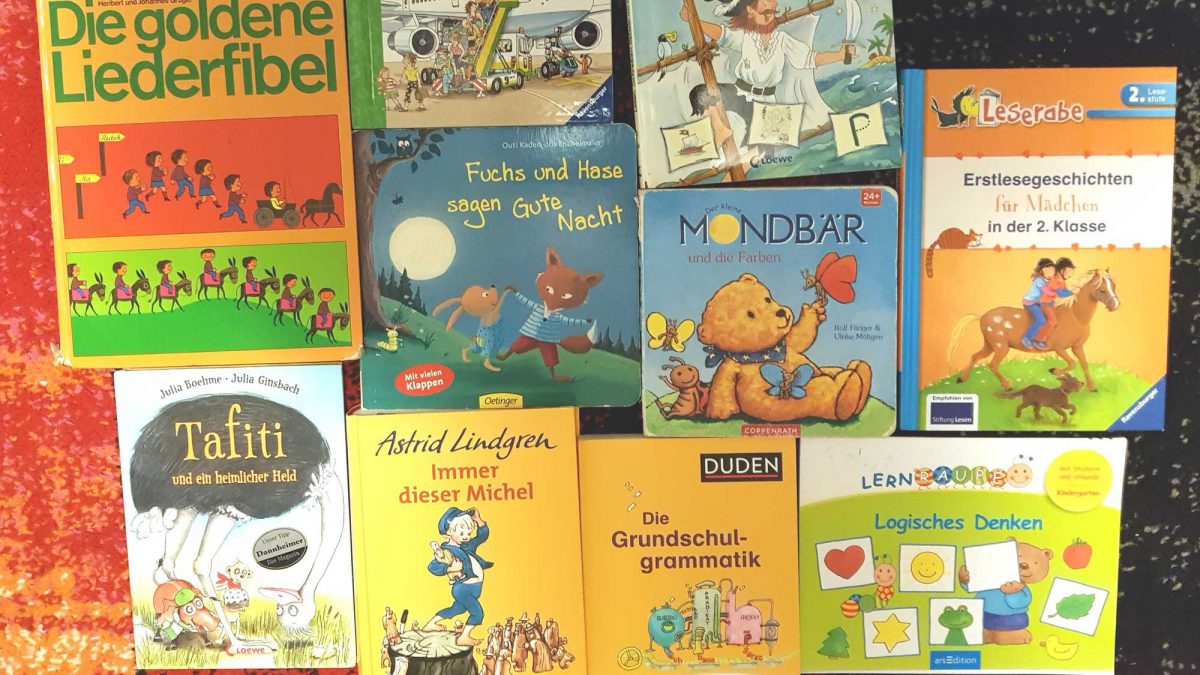About our Family
Let me tell you about our circumstances first. My partner David is from England and I am from Germany. Since the birth of our four children we’ve been living in New Zealand and Australia. Here we are trying to raise bilingual children with coordinated bilingualism. This is where both parents have different mother tongues and each parent speaks only his or her own mother tongue to the child.
Before my children were born, I had very strong ideas about how I was going to raise them as bilingual children. I was hoping they would grow up learning at least two, if not three different languages.
Benefits of being bilingual
I grew up in Germany and went to Primary and High School there. German education puts a strong emphasis on languages. Therefore languages have always been a very important part of my life.
I’ve always tried my best to learn at least a few sentences of the language of any country I’ve ever travelled to.
There is so much to be said for the benefits of being good at speaking languages. Your ability to immerse yourself into a new culture is taken to a completely new level if you are able to speak to the people in their own language.
Furthermore it is said that children speaking more than one language achieve better academic results. This is because they can often concentrate better and are better at solving problems. They also understand language structures better and are better at multitasking.
So I knew all the benefits and was determined to succeed in this feat. How difficult could it be to raise bilingual children? I thought if I spoke enough German with them, they would surely have it imprinted on their brains. Admittedly I was slightly naive about it. I had little idea about what a difference somebody’s particular family situation will make for their success.
Here’s a list of a few situations that will be beneficial for raising bilingual children:
- both parents speak the second language at home
- you have a good family or friend network who all speak the second language with your children
- you have only one child and only speak the second language to them
- your child goes to a language school
- your child is home schooled
Initial success of raising bilingual children
Everything was going well with our first daughter Ayla who was born in New Zealand. Even before she was born, I was making a great effort of only ever speaking German to her. By the age of two she was only speaking German to me. She also had a perfect ability of switching over to English to speak to her Daddy or others.
Things were very different with our second daughter Kyra though. As soon as she was old enough to start actively playing with Ayla they only spoke English together. English was Ayla’s play language because this is what she spoke with her friends at Kindy. When it was just Ayla and me at home it was easy to make German the only language spoken in the house. Suddenly the two girls were speaking English at home all the time. Therefore it was getting more and more difficult to get them to reply to me in German.
At least I was able to keep up the habit of exclusively speaking German to them. Also we had a great network of German speaking families in New Zealand and attended German playgroups. So Kyra grew up understanding German very well and speaking some basic German.
Change of our circumstances and its impact on raising our bilingual children
Then we decided to move to Australia. After travelling in a caravan for 1 1/2 years , we finally settled in the South West. A beautiful area but with hardly any German community. During our travels David was always with the family. Gradually my commitment of speaking only German with the kids started to crumble. I didn’t even notice it at first. What had always come so naturally to me suddenly took a conscious effort.
I’m sure this is the reason why my son Toby, who was born in Australia, does not speak any German except for a few words. Even his understanding ability is somewhat limited. Our fourth child Miya is only just starting to speak her first words, but I’m determined to make a better effort again, even if it seams like hard work now.
I decided to compile this list of tips because I wish somebody had given me something like this when my kids were little. I totally appreciate that these tips might not work or be relevant for everyone, as it all depends so much on your individual circumstances.
1. Only ever speak your mother tongue to your children
This might seem like the most obvious advice ever for raising bilingual children. However it is not as easy as it sounds and it is worth reminding yourself to do so all the time. You must make a solid, unbreakable habit out of it.
There might be situations when you or your child feel embarrassed about speaking your mother tongue in public. Tell yourself that this is an unreasonable sentiment. Also, don’t think that it is important for other people to understand what you are saying to your child. If your child is embarrassed this will be a great opportunity to explain about cultural differences. Explain to them that it is important for people to respect each other’s differences, be it their body shape, skin colour or language.
There might be a situation when you have to speak a different language. For example you might have to address your child and their friends together. Of course that’s okay. Just try to never fall into a habit of doing it.
2. Predominantly allow media in your native language at home
Books
Buy lots of books in your mother tongue to have a good selection always at hand at home. You can probably find a pretty good range to buy online. You could also ask your friends and family to send them out to you for Christmas and birthday presents. Libraries also sometimes have a small amount of foreign language books.
Audio Books
‘Audible‘ have a great choice of audio books in all languages.
Movies and TV Programs
You can find almost anything on ‘Youtube’. ‘Netflix’ allows you to choose different languages for most shows, which you can change in the ‘audio settings’. It can be a bit tricky though to find good programs in your mother tongue, depending on which language it is you require. There are some ways of getting more content of a certain language. Unfortunately I’m not really an expert, but try the site ‘Lindsay does languages’ for some great Netflix language tricks.
3. Join playgroups with people who speak your mother tongue
Try to join a network of people who speak your mother tongue in your area. There might be some playgroups you could join or simply a network of families who meet up on a regular basis. If you can’t find any existing groups, maybe you could start some?
It is an invaluable way for you kids to practice their second language by talking to other people. They need to hear other people speak the language not just you. This somehow seems to manifests the value of it. Also, it will be good practice for you too to speak to others. It might sound impossible to become out of practice of speaking your own mother tongue. Believe me, it is possible. It happened to me.
4. Encourage as many people from your birth country to come and visit you as possible
Keep asking your friends and family from your home country to come and stay with you. I’ve always been amazed about what a miraculous impact these visits have had on my children’s German proficiency.
5. Aupair who speeks your first language as help for raising bilingual children
It is obviously extremely beneficial to have another person at home who speaks your mother tongue with you and with your kids. Also aupairs often form a very strong bond with your kids and this helps them to accept the language.
6. Reward system to encourage replying in the second language
I’ve met parents who pretend not to understand if they get a reply in the first language. I personally have never been able to do this. I feel that it would hinder the conversation flow between my kids and me. Instead I’ve preferred rewarding them for trying their best.
7. Homeschooling language day
Have a homeschooling language day at least once a week to practice written proficiency of the second language.
It can be very difficult though to get you children to sit down for another lesson when they come home from school in the afternoon. You could hold the lessons on weekends if that makes it easier.
8. Language tutor
Get a good language tutor if you don’t mind spending the extra money. This might be a better solution for you than having to battle with your children about doing their lessons.
9. Pen Pal
You could ask one of your friends or family in your native country to become your child’s pen pal. Messages could be sent either by good old fashioned letters or by e-mails, text messages, etc. The letters could also become a part of your homeschooling lessons.
There are also plenty of web communities for finding pen pals of any spoken language.
10. Language Games
Encourage Role Play in Second Language
When my girls were between 3-5 years old I sometimes used to let watch German TV programs. Afterwards I would often find that they would turn the show they’d just watched into their own role play. To my great excitement they would then often talk German whilst playing. This was amazing, because their play language was normally always English.
Play Conversation Games in Second Language
Driving in the car or going for a walk is a great time to play conversation games with the important rule of only being allowed to use your mother tongue. You can pretty much turn any conversation game (like ‘I Spy’, ‘Fact or Fiction’, ‘Secret Message’, etc.) into a conversational language game.



